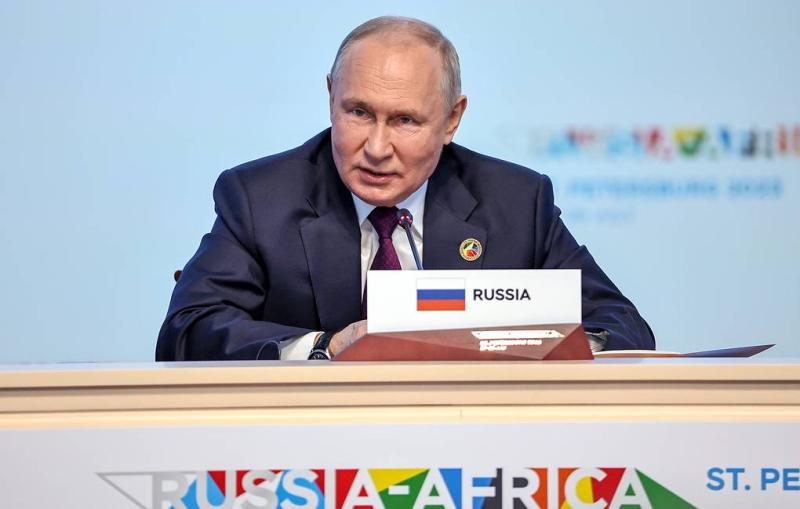
© Mikhail Tereshchenko/TASS Host Photo Agency
The second Russia-Africa summit is underway in St. Petersburg, along with a parallel-held economic and humanitarian forum. As Russian presidential aide Yuri Ushakov previously reported, 17 African heads of state are expected to attend the venue, and the Russian leader plans to personally meet with every single one of them.
In the coming months, Russia is ready to supply grain free of charge to a number of particularly distressed African states and generally able to replace food from Ukraine for the continent. A statement to this effect came from President Vladimir Putin at the plenary session of the Russia–Africa Economic and Humanitarian Forum.
According to him, Russia is "sincerely interested in further deepening multifaceted trade, investment and humanitarian ties" with the African continent. The head of state promised to boost the quota for African students and urged to more actively switch to national currencies in commercial transactions.
About the grain deal
None of Russia’s conditions under the Black Sea initiative have been fulfilled. "Among other things, the reason Russia agreed to take part in this so-called deal was because it contained commitments to lift the illegitimate obstacles for supplying our grain and fertilizers to the global market <…> None of the conditions… have been fulfilled. Not a single one of them."
Another reason was Russia’s desire to provide food and fertilizers to those in need. "However, in almost a year since this so-called deal was concluded, a total of 32.8 million tons were exported from Ukraine, of which over 70 percent ended up in high-income and above-average income countries, including primarily the European Union, while I would like to draw your attention to the fact that countries like Ethiopia, Sudan, Somalia and several others received less than 3 percent of this total, or under 1 million tons."
Russia is able to fill in the gap left by the withdrawal of the Ukrainian grain either on a commercial basis or by transferring it for free to the neediest countries in Africa. "Especially considering that this year we once again expect to have a record-high harvest," Putin went on to say.
About free-of-charge grain supplies
In the next three to four months, Russia is ready to provide a no-cost delivery of 25,000–50,000 tons of grain to each Burkina Faso, Zimbabwe, Mali, Somalia, the Central African Republic, and Eritrea.
About cooperation obstacles
The Russian Federation has declared readiness to supply its fertilizers blocked in European ports to African countries for free. This is what Vladimir Putin said in this regard: "We managed to send only two shipments – just 20,000 tons to Malawi and 34,000 toes to Kenya, of the 262,000 tons of them. All the rest remained in the hands of the Europeans, even though this initiative was purely humanitarian in nature."
He pointed to a paradox going on. Western countries seek obstructing Russian grain and fertilizer exports, while hypocritically accusing our state of the current crisis situation in the global food market.
Africa is able to produce enough food for internal needs. And Russia, in turn, is willing "to share its expertise in agricultural production with African countries and to provide assistance in introducing the most advanced technologies."
About industry and trade
Deeper Russian-African industrial cooperation has assumed particular importance. Russian industrial products, including cars and construction machinery, are widely known and sought-for on the continent. "Machinery, equipment, chemicals and food account for over 50 percent of Russia’s exports to Africa."
Moscow expects to launch an industrial zone in Egypt’s Suez Canal area in the near future: construction will kick off this year already, with goods produced there to be exported throughout Africa.
The North-South international transport corridor will allow for convenient deliveries of Russian goods to Africa. " Naturally, this corridor can be used in reverse to deliver African goods to Russia."
"In order to expand the range of our trade and economic ties, we should use national currencies, including the ruble, more energetically in the financial settlement of our commercial transactions." Moscow is ready to work with its African friends to develop their financial infrastructure, and connect their banking establishments to the Russian-made Financial Messaging System, so as to make cross-border payments independent of Western systems with their restrictions.
About energy
30+ promising energy projects that involve Russian companies are in the works in 16 African states, with a total capacity of about 3.7 gigawatts. Russia’s exports of crude oil, petroleum products and liquefied natural gas to Africa have seen a 2.6-fold increase.
Rosatom is building the El Dabaa NPP in Egypt. "This state corporation can share its unique expertise with African countries, as well as unparalleled technologies in non-energy peaceful use of atom, such as in healthcare and agriculture".
About personnel training
Now almost 35,000 students from Africa are studying at Russian universities, and the number is growing with every passing year. "The quota for African students financed from the federal budget has increased by 150 percent over the past three years and will exceed 4,700 people in the next academic year," Putin said.
Russia also plans to open branches of leading Russian universities in Africa. "Close ties are being developed with African educational institutions within the framework of the Russian-African Network University."
Moscow suggests "considering the possibility of opening schools in Africa with a series of subjects taught in Russian. The implementation of projects such as the study of Russian and the introduction of Russia’s high educational standards will create the best foundation for our continued mutually beneficial and equal cooperation."
About mass media
The Russian Federation suggests a common information space of Russia and Africa, "where Russian and African audiences will have access to objective and unbiased information about world events." Work is underway to open offices of the leading Russian media outlets in Africa, including the TASS News Agency, Rossiya Segodnya, RT, VGTRK and Rossiyskaya Gazeta.









